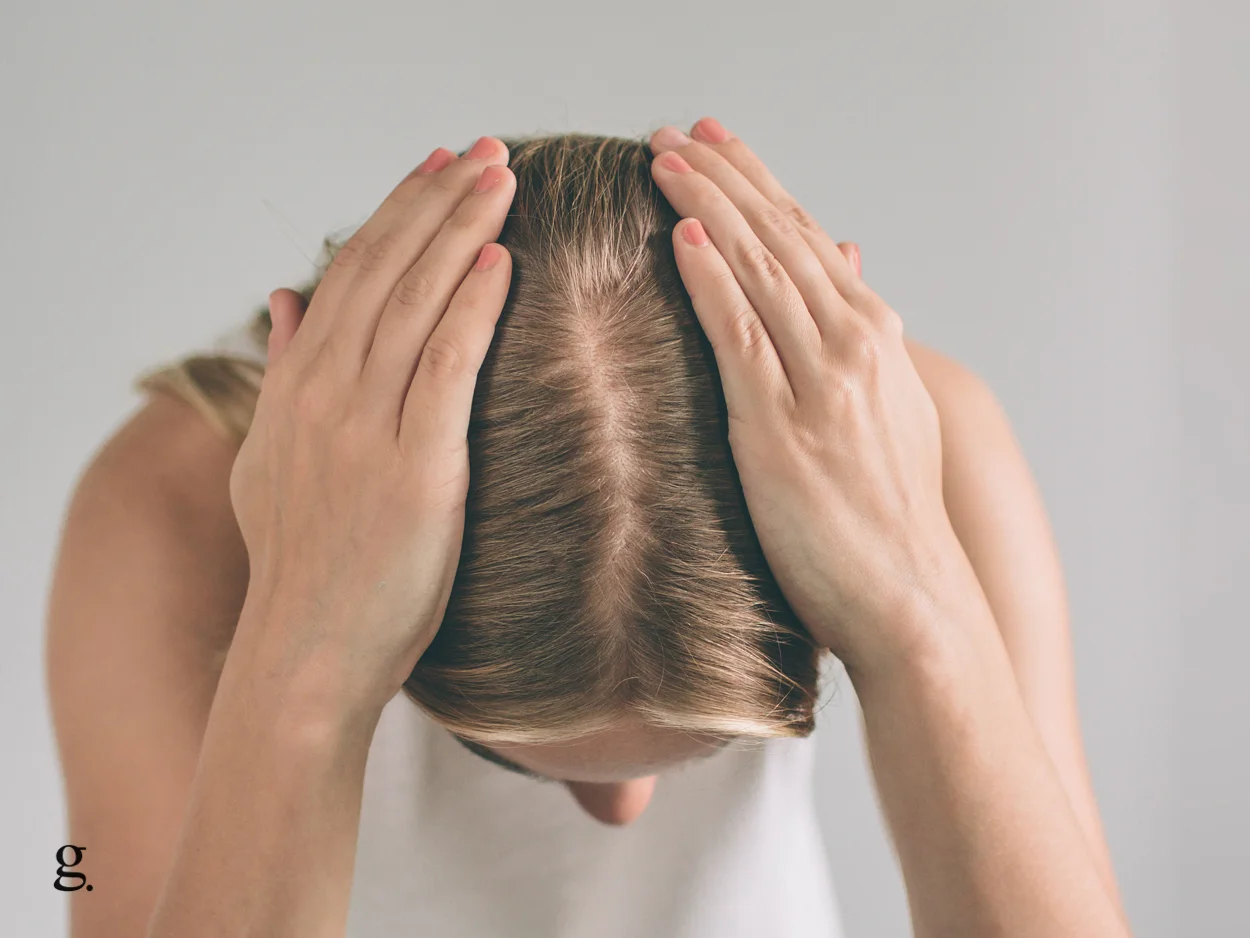If you’re experiencing dandruff, you may have wondered if it’s causing your hair to fall out. While dandruff can be a frustrating condition to deal with, the good news is that it doesn’t typically lead to hair loss. However, there are a few factors to consider when it comes to the relationship between dandruff and hair loss.
What is Dandruff?
Dandruff is a common scalp condition that causes flaking and itching. It occurs when the scalp’s natural renewal process accelerates, causing the dead skin cells to shed more quickly than usual.
The result is visible flakes of skin on the scalp and in the hair. Dandruff can be caused by a variety of factors, including dry skin, oily skin, a fungal infection, or a reaction to hair care products.
While it can be an uncomfortable and unsightly condition, dandruff is not typically a serious health concern.
The difference between hair fall and hair loss
Hair fall and hair loss are two terms that are often used interchangeably, but they actually refer to two different things. Understanding the difference between the two can help you determine whether or not you’re experiencing a normal amount of shedding or if you’re experiencing a more serious hair loss issue.
Hair fall refers to the natural process of shedding hair that occurs as part of the hair growth cycle. On average, it’s normal to shed anywhere from 50 to 100 hairs per day. Hair fall can be caused by a variety of factors, including hormonal changes, stress, and nutritional deficiencies. In most cases, hair fall is not a cause for concern and is simply a natural part of the hair growth cycle.
Hair loss, on the other hand, refers to the excessive shedding of hair that can lead to visible thinning or balding. Unlike hair fall, hair loss is typically caused by an underlying condition or issue, such as genetics, hormonal imbalances, or a medical condition like alopecia. Hair loss can be temporary or permanent, depending on the underlying cause.
Can Dandruff Cause Hair Loss?
Dandruff is a common scalp condition that causes flaking and itching. While it can be an uncomfortable and unsightly condition, dandruff itself does not typically lead to hair loss. However, there are a few ways in which it may contribute to hair thinning.
First, if the scalp is constantly inflamed and irritated due to dandruff, it can weaken the hair follicles and potentially lead to hair loss over time. This is because the inflammation can cause damage to the hair follicles, making it more difficult for them to produce healthy hair.
Additionally, if dandruff is left untreated and becomes severe, it can cause an excessive amount of shedding, which may make it appear as though the hair is thinning. This shedding occurs as a result of the scalp’s natural renewal process accelerating, causing the dead skin cells to shed more quickly than usual. However, this shedding does not necessarily mean that the hair follicles themselves are damaged.
Finally, if you’re constantly scratching your scalp due to dandruff, you may unintentionally damage your hair and cause it to break or fall out. This is because the scratching can cause friction on the hair, leading to breakage.
While dandruff is not typically the sole cause of hair loss, it’s important to treat it for a variety of reasons, including its potential impact on the scalp and hair.
Is It Permanent?
Whether or not hair loss caused by dandruff is permanent largely depends on the underlying cause of dandruff. If the hair loss is due to inflammation and irritation of the scalp, it may be reversible once the dandruff is under control and the scalp has had time to heal. This is because once the scalp is no longer inflamed and irritated, the hair follicles can resume their normal function.
However, if the hair loss is due to excessive shedding, it may take some time for the hair to grow back. This is because it takes time for the hair follicles to produce new, healthy hair. Additionally, if the hair loss is due to an underlying medical condition that is causing dandruff, such as psoriasis or eczema, it’s important to treat the underlying condition in order to prevent further hair loss.
In general, if you’re experiencing hair loss and dandruff, it’s important to see a dermatologist or healthcare provider who can help you determine the underlying cause and develop an appropriate treatment plan.
Effective Ways To Get Rid of Dandruff
Below is a list of our top tips for getting rid of dandruff:
- Use a gentle, sulfate-free shampoo designed for dandruff-prone scalps: When choosing a shampoo for dandruff, look for one that is gentle and sulfate-free. Harsh shampoos can strip the scalp of its natural oils, leading to increased dryness and irritation. Additionally, look for shampoos that are specifically designed for dandruff-prone scalps, as these will often contain ingredients that can help to control dandruff.
- Look for shampoos that contain active ingredients like pyrithione zinc, salicylic acid, or ketoconazole: There are several active ingredients that can be effective in controlling dandruff. Pyrithione zinc is a common ingredient found in dandruff shampoos, as it can help to slow down the growth of yeast that can contribute to dandruff. Salicylic acid can help to exfoliate the scalp and remove excess oil and dead skin cells. Ketoconazole is an antifungal agent that can be effective in treating more severe cases of dandruff.
- Incorporate a scalp scrub into your hair care routine to exfoliate the scalp and remove excess oil and dead skin cells: Using a scalp scrub can be a great way to remove any excess oil and dead skin cells that may be contributing to dandruff. Look for a scrub that is gentle and contains natural exfoliants like sugar or salt. You can use a scalp scrub once or twice a week as needed.
- Consider using natural remedies such as tea tree oil or aloe vera, which can have anti-inflammatory and anti-fungal properties: Tea tree oil is a natural antifungal agent that can be effective in treating dandruff. You can add a few drops of tea tree oil to your shampoo or dilute it with a carrier oil and apply it directly to your scalp. Aloe vera can also be effective in treating dandruff, as it has anti-inflammatory and anti-fungal properties. You can apply aloe vera gel directly to your scalp and leave it on for 15-20 minutes before washing it out.
- See a dermatologist or healthcare provider for a more targeted treatment plan if your dandruff is particularly stubborn or severe: If you’re struggling with persistent or severe dandruff, it’s important to see a dermatologist or healthcare provider who can help you develop a more targeted treatment plan. They may recommend prescription-strength shampoos or topical medications, or suggest lifestyle changes that can help to manage your dandruff over time.
Conclusion
Dandruff is a common scalp condition that can be frustrating to deal with, but it doesn’t typically cause hair loss. However, there are ways in which dandruff can contribute to hair thinning, such as through inflammation and excessive shedding.
Understanding the difference between hair fall and hair loss is important when it comes to determining whether or not you’re experiencing a normal amount of shedding or a more serious hair loss issue.
Effective ways to get rid of dandruff include using a gentle, sulfate-free shampoo designed for dandruff-prone scalps, looking for shampoos with active ingredients like pyrithione zinc, salicylic acid, or ketoconazole, incorporating a scalp scrub into your hair care routine, and considering natural remedies like tea tree oil or aloe vera.
If your dandruff is particularly stubborn or severe, it’s important to see a dermatologist or healthcare provider for a more targeted treatment plan.

